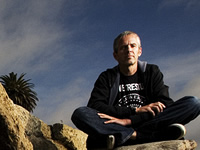Q & A with Surfrider CEO Jim Moriarty
When it comes to making sure our playground is safe and accessible there is one organization that stands heads and shoulders above the rest as far as dedication and perseverance to the cause. The Surfrider Foundation has been around since 1984, getting involved and trying to ensure the protection and enjoyment of the world’s oceans, waves, and beaches for all people, through conservation, activism, research and education. We dropped Surfrider CEO Jim Moriarty a few questions to get his take on a few different subjects and to find out what the biggest hurdles are that Surfrider faces. Grab a cup of coffee and check out what he had to say –
Q. Please tell us a little about yourself and your surfing life. How did you get involved with the Surfrider Foundation?
 I was weaned on punk rock, skateboarding and snowboarding. I took up surfing in my twenties and never looked back. Today, I categorize myself as a surfer above most other categories. A few years ago I was recruited to the Surfrider Foundation. I’d been a fan and supporter for years but was living and working in the technology sector. Initially I didn’t think I was the right person for this job, but after some extended dating the board convinced me otherwise. They were right and I was wrong, I’m home.
I was weaned on punk rock, skateboarding and snowboarding. I took up surfing in my twenties and never looked back. Today, I categorize myself as a surfer above most other categories. A few years ago I was recruited to the Surfrider Foundation. I’d been a fan and supporter for years but was living and working in the technology sector. Initially I didn’t think I was the right person for this job, but after some extended dating the board convinced me otherwise. They were right and I was wrong, I’m home.
Q: Your Ocean Waves Beaches blog is an extremely focused outlet for getting the word out on what Surfrider is about – not just specific issues but bigger overall ideals. How has the feedback on the blog been both internally and from the public?
I would characterize the feedback on my blog as -hesitantly optimistic. What I mean by that is the Surfrider Foundation culture and I might argue is that the activist/environmental culture in general is still getting their collective head around internet communication vehicles. A large percent of the reason I’ve created blogs, wikis, podcasts and vodcasts is to show people what is out there what is possible what tools exist. I know that the second wave of users and creators will take these and other new tools and do insane things with them. I’m an instigator in this sense and that is very intentional. So it’s not about whether my personal blog is relevant or not, but rather if our collective messaging on the Internet is. I want to simply push people out into new spaces and have Surfrider Foundation’s mission and influence create new on-ramps for people.
Q: You talk repeatedly about “on-ramps” on your blog. At some point for people to get involved they have to connect with some issue, however big or small, that they can identify with and be passionate about. What do you feel is the biggest hurdle in getting people involved, not only with Surfrider but conservation in general?
Historically, the biggest hurdle in getting people involved was Green’s self-congratulatory and exclusionary mindset. Green was a club and they really weren’t looking to attract new members. Anything that discounts a large portion of the population is destined to be small and irrelevant. I think that hurdle has shifted with the current trends of the green movement.  Today, the largest hurdle is giving each person on the planet an on-ramp that fits. We need to give everyone a way to plug in that is tailored to his or her interests. For example, if a person is really into digital photography, then they probably won’t plug into our legal issues team. Instead, they need a digital photography onramp. THEN, after they’ve come on, they will become educated on issues beyond their initial interest are, and the impact will be much larger than digital photography. This concept and the challenge behind figuring out how to transition someone’s love into a larger movement, is one of the things that keeps me awake night after night.
Today, the largest hurdle is giving each person on the planet an on-ramp that fits. We need to give everyone a way to plug in that is tailored to his or her interests. For example, if a person is really into digital photography, then they probably won’t plug into our legal issues team. Instead, they need a digital photography onramp. THEN, after they’ve come on, they will become educated on issues beyond their initial interest are, and the impact will be much larger than digital photography. This concept and the challenge behind figuring out how to transition someone’s love into a larger movement, is one of the things that keeps me awake night after night.
Q. As an activist, do you see degradation moving faster than conservation? Do you think that as a society we’ll be able to slow our pace of development enough to possibly reverse some of the damage that has been done?
Short answer, yes. Longer answer, the world has changed radically in the past fifteen years and most of its inhabitants haven’t seen or understood the ramifications of the changes. As a result, they haven’t changed their habits. Friedman’s “The World is Flat” summarizes many of these changes – until America collectively understands they’re not the only ones with their hands on the steering wheel, we’re heading towards a cliff. China just surpassed America with internet usage (we have 75% of our population online and they have just 12%). Having China and India join the U.S. at our level of consumption calls for five planets of natural resources (thus the shifts in commodity prices we’re seeing globally). These three countries must change course or we may be toast. This reality points to why I am a fan of the developments characterized in Krupp’s recent “Earth: the Sequel.”
Q. What’s your take on the burgeoning environmentally friendly surfboard market? Do you think that people around you are taking note and looking for equipment that’s intentionally less polluting?
I think the environmentally friendly market for everything is in the nascent stage of its development, thus we’re living through the awkward years right now. That said I love it. Looking specifically at the surfboard market – I love that Danny Hess is not only making insane, workable quads, but even more is that Dan Malloy is on the cover of Surfer’s Journal absolutely ripping on one. That’s a key piece of the equation… people need to see that new technologies, in this case greener boards, work. But they need to see them doing more than working, they need to see them ripping. Another angle into this is that a green board isn’t simply equipment that’s made from natural products but also boards that last a long, long time. Shane Dorian rips on a Surftech, so it’s validated as ripable. But it’s more than that, a high school buddy ran over a Surftech in his truck with all four wheels and the board was fine. Sometimes the answer isn’t as obvious as it might seem.
Q. One aspect that often is not addressed in environmental activism is our consumer lifestyle and how that affects our ecosystem. Let me be clear. I don’t mean to say that we should not consume, I understand that it’s in our nature as humans. What I am referring to is our culture of over consumption or conspicuous consumption. Do you think that it’s just too close to home for people, that we feel entitled to purchase anything and everything because we worked for it? Do you see a possibility of a cultural shift to a simpler life?
Yes, I do see the possibility of a cultural shift to a simpler lifestyle. To be frank, I don’t see that with most people over a certain age, as they seem to find such changes quite hard. They also lived most of their life with a -more is more- mentality: a house as the American dream, and a second house as a better dream than that, etc. We’ve all seen this when we talk about global warming with someone over a certain age.

Photo: Steve Sherman
It’s very, very hard for them to grasp the fact that their collective choices (as well as my choices) created something so potentially horrific. This isn’t age discrimination, its just habits built over time. I’m 45 and I see this in myself and with my friends. Lifestyle changes simply seem to be harder as people age. The flipside is the cultural movement work that people like Jack Johnson are doing. My kids… everyone’s kids… know the words to his 3R song; reduce, reuse, recycle. The wave of awareness and consciousness regarding the environment with youth is massive. It’s a tsunami. I’m betting on those youths and non-youths that think youthfully to drive many of these shifts.
Q. What’s your take on the fashion industry built around surfing? It’s clear that some of the companies donate towards environmental causes but overall what influence do you think the fashion industry has on surf culture?
In my opinion, surf culture in many ways reflects what we see created by surf retailers. I say this because I see a large cross section of people that surf in my day-to-day life and much of the time their lifestyle and self-awareness is an extension of the surf brands they wear. Of course it’s not this simple, there are fragments of surf culture that represent many sub-groups. I happen to personally really identify with all things Sprout, Andy Davis, fish-culture, etc. I’ve always been into the artist splinter of surf culture but I know there are hot-rod and old-guys-rule veins in surf culture, as well as the zillions of international mixes of various flavors of surf culture. Still, put all that together on a massive white space and you’ll see some dominant form. I’d argue those reflect what we collectively think of when we think of the surf industry. I’d also add that there are leaders and companies that have been dialed into environmental support and themes for decades, Paul Naude at Billabong and Yvon Chouinard at Patagonia come to mind.
Q: In your position, you probably have a better overall global view of the problems affecting surfers such as access, water quality, and pollution than most people in the industry. What do you see as the biggest threats facing surfers both today and in the foreseeable future?
Apathy. No question in my mind. Surfrider Foundation is global; we have 80 entities around the world. A majority of those entities and activists that are driving campaigns aren’t surfers but rather incredibly aware, driven beach enthusiasts. We need more surfers involved. The writing is on the wall; beaches are being lost, beach access is being lost, waves are being lost, water quality is being lost. Read this list of recent victories, then go to this list of chapters to find a way to plug in.
Q. What does sustainability mean to you?
Sustainability means that an action can be done in indefinitely.
Q. Any last words of wisdom?
Life can seem complex but it’s not. Take a step back and see cultural inanity for what it is… turn your TV off; take up an instrument, do something new. Lastly, know what you love and then put yourself into that thing. For those of us involved with the Surfrider Foundation that thing is oceans, waves and beaches. We love those. Whatever you love, act to protect it, act to make it flourish. Act.
Find out more about Surfrider and find a local chapter near you and get involved – www.surfrider.org
Check out Jim’s blog over at oceanswavesbeaches.blogspot.com/
Listen to some interesting dialogue on the Podcasts at www.surfrider.org/media4.asp
As much as i have always admired Surfrider Foundation US for their actions in the US (or at least what i’ve read about them in the US mags) i must say i wished that their European counterpart was half as active. Did i say half? No, 1/10th would be enough!!!
Not only they’ve (Surfrider Europe) got a very narrow vision of what’s happening out there, but also their strategy has put many people off as they seem extremely localized in a small stretch of coast.
NiegÃ
P.S.: And please don’t tell me to get involved and start a chapter. I think we did much more than that. Check it out here: http://www.youtube.com/watch?v=xRoH-6Vm0HM and we never got the slitghest help from SF Europe ever.